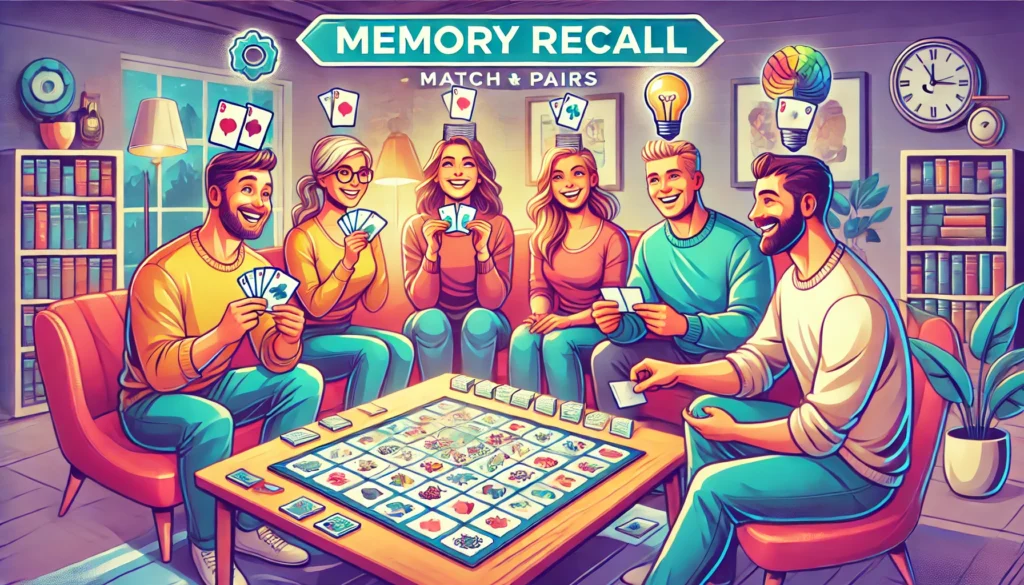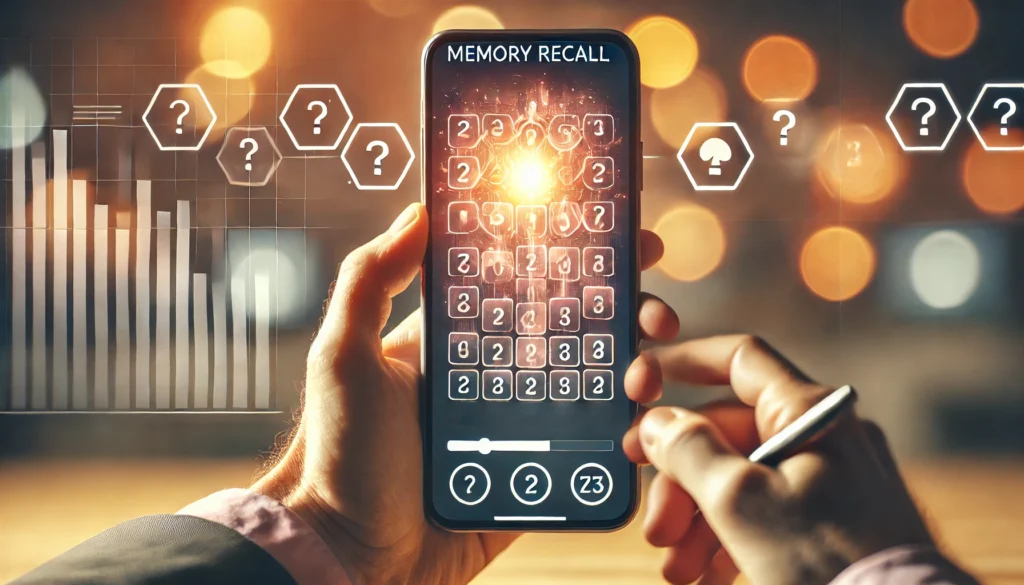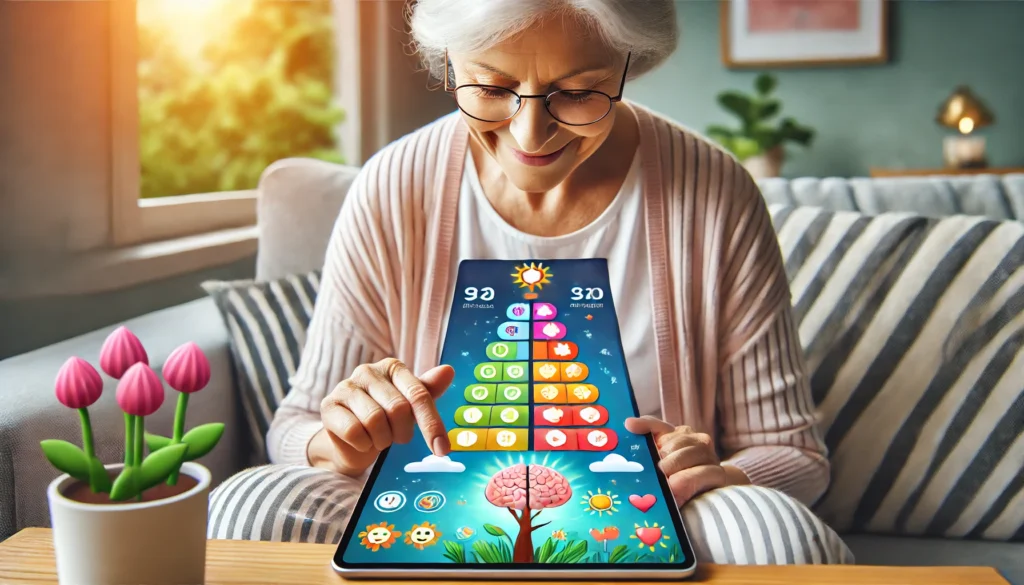In today’s fast-paced world, maintaining a sharp memory is more crucial than ever. With the constant influx of information, keeping your cognitive faculties in top shape can be a challenge. Fortunately, enhancing your memory doesn’t have to be a dull or arduous task. Engaging in fun and interactive games can significantly boost your memory recall and cognitive abilities. In this article, we will explore various games designed to enhance memory, delve into the science behind their effectiveness, and provide actionable tips to incorporate them into your routine.
You may also like: Effective Techniques for Memory Practice Improvement
The Science Behind Memory Games
Memory games are more than just a source of entertainment. They leverage neuroplasticity, the brain’s ability to reorganize itself by forming new neural connections throughout life. This adaptability is crucial for memory enhancement. When you challenge your brain with cognitive games, you stimulate the growth of new brain cells and strengthen existing connections, thereby improving memory recall and cognitive function.
Understanding Neuroplasticity
Neuroplasticity is a fundamental concept that underscores the brain’s ability to change and adapt in response to new experiences, learning, and memory formation. This adaptability is particularly relevant when it comes to memory enhancement. Engaging in cognitive games can harness neuroplasticity to bolster your memory.
When you participate in activities that challenge your brain, such as solving puzzles or playing strategy games, you are essentially giving your brain a workout. This workout encourages the formation of new neural pathways and strengthens existing ones, leading to improved cognitive function and memory recall.
The Role of Brain Regions in Memory
Different brain regions play distinct roles in various types of memory, such as short-term and long-term memory. The hippocampus, for instance, is crucial for forming new memories and connecting them to emotions and senses. By engaging in memory-enhancing games, you activate these regions, fostering better memory retention and recall.
Research indicates that stimulating the brain through targeted games can enhance the efficiency of these regions. This stimulation not only aids in memory recall but also enhances cognitive flexibility, allowing the brain to adapt and respond to new challenges more effectively.
Cognitive Load and Memory Enhancement
Cognitive load refers to the amount of information your brain can process at any given time. By playing memory games, you can train your brain to manage and distribute cognitive load more effectively. Games that require multitasking or quick decision-making can increase your brain’s capacity to handle complex information, leading to better memory retention.
Reducing cognitive overload through consistent practice can significantly enhance your brain’s ability to store and recall information. As you engage in these activities, you are conditioning your brain to handle more information without feeling overwhelmed.
Types of Memory-Enhancing Games
There is a wide array of games designed to enhance memory, each with its unique approach and benefits. Here, we will explore some of the most effective types of games for memory recall.
Cognitive Games
Cognitive games are designed to challenge various aspects of your mental faculties, including memory, attention, and problem-solving skills. These games often require you to think critically and make quick decisions, thereby enhancing your cognitive abilities.
Some popular cognitive games include:
- Lumosity: A well-known platform offering a variety of games that target different cognitive skills, including memory.
- Elevate: An app that provides personalized training programs to improve memory, focus, and cognitive skills.
- CogniFit: This platform offers a range of cognitive training programs designed to boost memory and other mental abilities.
Interactive Platforms for Brain Training
Platforms like Lumosity and Elevate offer a myriad of games tailored to enhance different cognitive skills. These platforms utilize data-driven insights to personalize your training experience. By consistently engaging with these platforms, users can track their progress and identify areas for improvement.
The advantage of using such platforms is their ability to adapt to your performance, ensuring that you are constantly challenged. This dynamic approach keeps the brain engaged and promotes continual cognitive growth.

Real-World Applications of Cognitive Games
Beyond digital platforms, cognitive games have real-world applications that extend to everyday tasks. By improving skills such as attention and problem-solving through games, individuals can enhance their ability to perform complex tasks at work or in social settings.
Incorporating cognitive games into your routine can lead to improved decision-making, quicker thinking, and a sharper memory, making daily challenges more manageable and less stressful.
The Psychological Benefits of Cognitive Games
Engaging in cognitive games not only boosts memory but also enhances mental health. These games can reduce stress and anxiety by providing a fun and engaging outlet for cognitive exercise. The sense of achievement and progress can improve self-esteem and foster a positive mindset.
By integrating cognitive games into your daily life, you can create a balanced approach to mental health and cognitive enhancement, leading to overall well-being.
Short Memory Games
Short memory games are perfect for those looking to give their brain a quick workout without dedicating a significant amount of time. These games are designed to be brief yet effective in enhancing memory recall.
Some examples of short memory games include:
- Memory Match: A classic game where you match pairs of cards, honing your short-term memory.
- Simon Says: A fun game that tests your ability to remember sequences of colors or sounds.
- Number Sequence: A game where you must recall and repeat sequences of numbers, enhancing your short-term memory and concentration.
Quick Brain Exercises for On-the-Go
Short memory games are ideal for those with a busy lifestyle, as they can be played during short breaks or commutes. These games provide a quick mental boost, improving focus and attention in a matter of minutes.
Incorporating these quick exercises into your daily routine can lead to significant improvements in memory retention over time, without requiring a substantial time commitment.
The Impact of Short Memory Games on Daily Tasks
Playing short memory games regularly can enhance your ability to remember lists, instructions, and other daily information. By improving short-term memory through these games, you can increase your efficiency and productivity in everyday tasks.
This enhancement can lead to better time management and task execution, making daily life smoother and more organized.
Social Aspects of Short Memory Games
These games can also be enjoyed in social settings, adding a fun and competitive element to gatherings. Playing with friends or family can create a lively and engaging atmosphere, encouraging everyone to participate and challenge each other’s memory skills.
Involving others in short memory games not only boosts cognitive abilities but also strengthens social bonds and creates memorable experiences.
Strategic and Puzzle Games
Strategic and puzzle games require you to think critically and plan ahead, which can significantly enhance your memory and problem-solving skills. These games often involve complex scenarios that challenge your cognitive faculties.
Some examples of strategic and puzzle games include:
- Chess: A classic strategy game that demands foresight and planning, stimulating your memory and cognitive abilities.
- Sudoku: A number puzzle that enhances logical thinking and memory recall.
- Crossword Puzzles: These puzzles require a broad vocabulary and memory recall, offering a fun way to boost your brainpower.
Enhancing Problem-Solving Skills
Strategic games like chess require players to anticipate opponents’ moves and plan several steps ahead. This mental exercise strengthens problem-solving skills and enhances memory by requiring players to recall past strategies and outcomes.
By regularly engaging in strategic games, you can improve your ability to tackle complex problems and develop creative solutions in real-world scenarios.
Logical Thinking and Memory Recall
Puzzle games like Sudoku and crossword puzzles challenge your logical thinking and memory recall abilities. These games require you to identify patterns, recall words or numbers, and apply logic to solve problems.
Consistent practice with these puzzles can improve your mental agility, making it easier to process and retain information in various contexts.
The Cognitive Benefits of Strategy-Based Games
Strategy-based games offer more than just entertainment; they provide a comprehensive workout for the brain. By engaging in these games, you enhance your memory, focus, and decision-making skills, which can translate into improved performance in professional and personal settings.
The cognitive benefits of these games make them a valuable addition to your memory-enhancing routine, offering both enjoyment and mental growth.
Practical Tips for Incorporating Memory Games into Your Routine
Integrating memory-enhancing games into your daily routine can be a seamless and enjoyable process. Here are some practical tips to help you get started:
Set Aside Dedicated Time
To reap the benefits of memory games, it’s essential to set aside dedicated time for them. Consider incorporating them into your daily routine, such as playing a quick game during your lunch break or before bedtime. Consistency is key to seeing improvements in memory and cognitive function.
Creating a Routine for Cognitive Training
Establishing a routine for playing memory games can help you stay committed and motivated. Determine a specific time each day to engage in these activities, whether it’s in the morning, afternoon, or evening. By making it a regular part of your schedule, you can ensure consistent progress and memory enhancement.
Consistency is crucial for maximizing the benefits of memory games, as regular practice reinforces neural pathways and cognitive skills.
Making the Most of Breaks with Memory Games
Utilize breaks during work or study sessions to play short memory games. This approach not only provides a mental refresh but also enhances focus and concentration for the tasks ahead. By integrating these games into your breaks, you can make the most of your downtime and boost productivity.
Using breaks for cognitive training can also reduce stress and improve mental clarity, making it easier to tackle demanding tasks.
Balancing Screen Time and Cognitive Activities
While digital platforms offer numerous memory-enhancing games, it’s essential to balance screen time with other cognitive activities. Consider incorporating traditional puzzles or physical games into your routine to diversify your brain training experience and prevent screen fatigue.
By varying your cognitive activities, you can maintain engagement and motivation, ensuring a well-rounded approach to memory enhancement.
Mix It Up
Variety is crucial when it comes to cognitive training. Engage in a mix of different types of games to challenge various aspects of your brain. This approach ensures that you are stimulating different neural pathways and maximizing the benefits of your memory-enhancing efforts.
Exploring a Diverse Range of Games
Experiment with different types of games to discover which ones resonate most with you. Whether it’s cognitive, strategic, or short memory games, each offers unique benefits that contribute to overall cognitive health. By exploring a variety of games, you can tailor your training to suit your preferences and goals.
Trying new games can also keep your brain engaged and motivated, preventing monotony and enhancing cognitive growth.
Adapting to Your Cognitive Needs
As you progress in your memory-enhancing journey, your cognitive needs may change. Be open to adjusting your game selection to target specific areas of improvement. For instance, if you notice a need for better problem-solving skills, focus more on strategic games.
Adapting your cognitive training to meet evolving needs ensures continued growth and development, allowing you to address specific challenges effectively.
Combining Physical and Digital Memory Games
Incorporate both physical and digital memory games into your routine for a comprehensive brain training experience. Physical games like board games or card games provide tactile stimulation, while digital games offer convenience and variety.
By combining these approaches, you can engage multiple senses and cognitive processes, enhancing memory retention and recall.
Track Your Progress
Keeping track of your progress can be highly motivating. Many cognitive game platforms offer tools to monitor your performance and track improvements over time. Use these features to set goals and celebrate milestones in your memory enhancement journey.
Utilizing Progress Tracking Tools
Take advantage of the tracking features available on cognitive platforms to monitor your performance. These tools provide valuable insights into your strengths and areas for improvement, helping you tailor your training for maximum effectiveness.
Tracking your progress can also boost motivation, as you can see tangible evidence of your cognitive growth and memory enhancement.
Setting Realistic Goals for Memory Improvement
Establish realistic and achievable goals for your memory enhancement journey. Whether it’s improving your score on a particular game or mastering a new type of puzzle, setting goals gives you a clear direction and purpose.
By achieving these goals, you can build confidence and motivation, driving further progress and cognitive development.
Celebrating Milestones in Cognitive Growth
Recognize and celebrate milestones in your memory enhancement journey. Whether it’s a personal best score or mastering a challenging game, acknowledging these achievements can boost morale and reinforce positive habits.
Celebrating milestones also provides an opportunity to reflect on your progress and adjust your goals for continued growth and success.
Involve Friends and Family
Playing memory games with friends and family can add a social element to your cognitive training. It not only makes the experience more enjoyable but also introduces a healthy level of competition, which can further motivate you to improve your memory skills.

Creating a Supportive Memory-Enhancing Community
Invite friends and family to join you in memory-enhancing games, creating a supportive community focused on cognitive growth. Playing together can foster camaraderie and provide an opportunity to learn from each other’s strategies and experiences.
A supportive community can also enhance motivation and accountability, encouraging everyone to stay committed to their cognitive training goals.
Hosting Game Nights for Cognitive Engagement
Organize game nights with friends and family to enjoy memory-enhancing games in a social setting. These gatherings provide a fun and interactive way to improve cognitive skills while strengthening social bonds.
Game nights can also introduce a variety of games, ensuring a diverse and engaging experience for all participants.
Encouraging Healthy Competition
A healthy level of competition can boost motivation and performance in memory games. Challenge friends and family to friendly competitions, setting goals and celebrating each other’s achievements.
This approach not only enhances cognitive skills but also makes the experience more enjoyable and rewarding, fostering a positive and motivating environment.
Future Implications of Memory Games
As technology continues to advance, the realm of memory-enhancing games is expected to evolve. Virtual reality (VR) and augmented reality (AR) are poised to revolutionize the way we engage with cognitive games, offering immersive and interactive experiences that can further enhance memory recall and cognitive function.
The Role of Technology in Memory Enhancement
Technology is rapidly transforming the landscape of cognitive training, with innovations like VR and AR offering new possibilities for memory enhancement. These technologies provide immersive experiences that engage multiple senses, enhancing memory retention and recall.
As technology continues to evolve, the potential for innovative and effective memory-enhancing games grows, offering exciting opportunities for cognitive development.
Emerging Research in Neuroscience
Ongoing research in neuroscience and cognitive psychology will likely yield new insights into the most effective ways to harness games for memory enhancement. These findings can inform the development of more targeted and effective cognitive training programs.
As our understanding of the brain continues to grow, so too will the potential for innovative and effective memory-enhancing games.
The Future of Cognitive Game Design
As the field of cognitive game design evolves, developers are likely to create more personalized and adaptive games that cater to individual needs and preferences. These advancements will ensure that cognitive training remains effective, engaging, and accessible for users of all ages and abilities.
The future of cognitive game design promises exciting developments that will enhance the way we approach memory enhancement and cognitive growth.

Conclusion
Enhancing your memory doesn’t have to be a mundane or laborious task. By incorporating fun and engaging games into your routine, you can significantly boost your memory recall and cognitive abilities. From cognitive games to strategic puzzles, there is a wealth of options available to suit your preferences and schedule.
By understanding the science behind memory games, exploring various types of games, and implementing practical tips for integration, you can embark on a rewarding journey to enhance your cognitive faculties. As you engage with these games, remember to embrace the process, celebrate your progress, and look forward to the exciting future of memory-enhancing technologies.
Further Reading:
The Best Mental Games and Exercises to Improve Memory
The best brain games to improve memory, concentration, and thinking skills
Important Note: The information contained in this article is for general informational purposes only, and should not be construed as health or medical advice, nor is it intended to diagnose, prevent, treat, or cure any disease or health condition. Before embarking on any diet, fitness regimen, or program of nutritional supplementation, it is advisable to consult your healthcare professional in order to determine its safety and probable efficacy in terms of your individual state of health.
Regarding Nutritional Supplements Or Other Non-Prescription Health Products: If any nutritional supplements or other non-prescription health products are mentioned in the foregoing article, any claims or statements made about them have not been evaluated by the U.S. Food and Drug Administration, and such nutritional supplements or other health products are not intended to diagnose, treat, cure, or prevent any disease.


